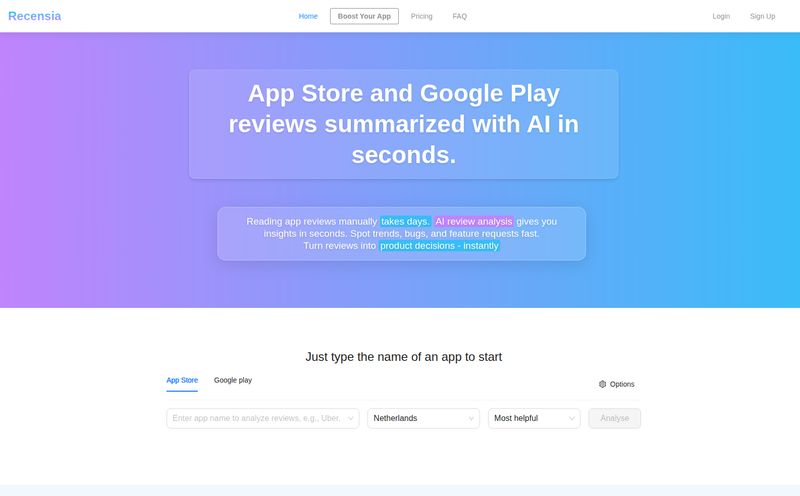Alright, let’s have a real chat. If you’re in marketing, content, or pretty much any creative field right now, your team's Slack channels or email threads are probably a complete mess of half-baked AI prompts and pasted responses. Right? It’s a chaotic symphony of “Hey, check out this idea I got from ChatGPT” followed by a wall of text that has zero context. It’s the digital equivalent of everyone shouting ideas into a crowded room. Fun for a minute, but productive? Not so much.
I’ve been in the SEO and content game for years, and I’ve seen tools come and go. The recent AI boom has been… a lot. Every other day, there's a new 'revolutionary' platform that's just a thin coat of paint on OpenAI's API. So, when I first heard about Verbee, I was skeptical. Another GPT-4 wrapper? Yawn. But I gave it a shot, and I’ve got to admit, I’m pleasantly surprised. It seems to tackle the one thing most AI tools forget: people have to work together.
So, What Exactly is Verbee Anyway?
Think of it less as a simple chatbot and more as a structured workspace for your team’s conversations with AI. It’s built on the powerhouse that is GPT-4, so you get all that raw capability. But Verbee wraps it in an environment designed for collaboration from the ground up. The whole point is to stop the endless copy-pasting and to start building on ideas in a single, coherent place.
It’s for those moments when a simple prompt-and-response isn't enough. It's for when you need to explore a concept, get feedback from a colleague, and then refine it with the AI, all without leaving the same screen. It’s trying to bring order to the beautiful chaos of brainstorming.
More Than Just a Chatbot: The Verbee Experience
This is where Verbee starts to pull away from the pack. It has a few core ideas that, in my opinion, really change how you interact with AI in a group setting.
Taming the AI with Context and Roles
This is my favorite part, hands down. We all know prompt engineering is the secret sauce. Garbage in, garbage out. Verbee gets this and builds a feature around it. Before you even start a conversation, you can set a specific context or role for the AI.
I can't tell you how many times I've asked a generic AI for 'ten blog post ideas' and gotten the most bland, soulless list imaginable. It’s maddening. With Verbee, I can first tell it, “You are a snarky, seasoned SEO blogger who has been writing for Google since the days of the Florida update and you hate corporate jargon.” The difference in the output is night and day. It’s not just about what you ask, it’s about who you’re asking. This feature alone makes the output feel so much more… human. And your team can see that role, so everyone understands the angle you're going for.
The Genius of Branching and Collapsing
Ever been in a great brainstorming session that gets derailed by a single, interesting-but-off-topic idea? Verbee has a brilliant fix for this: branching. Imagine your main conversation is the trunk of a tree. Someone has a tangent idea. Instead of cluttering up the main thread, you can just start a new branch from that point. You can explore that rabbit hole for as long as you want. If it turns into a dead end, no problem. If it’s gold, it’s saved right there, connected to its original inspiration.
And to prevent the screen from looking like a chaotic mind map, you can collapse branches you're not focused on. It’s such a simple, elegant way to keep conversations clean while encouraging creative exploration. It lets you say “yes, and…” without losing the plot.
Collaboration That Actually Works
The sharing and collaboration features are dead simple, which is exactly how they should be. With one click, you can share a whole conversation—branches and all—with a teammate. They can jump in, add their own prompts, start new branches, and contribute directly. No more screenshots. No more “I’ll paste what I have into a Google Doc”. Its a real, living document of your team's thought process. This feels like how AI was meant to be used in a professional setting.

Visit Verbee
Lets Talk Turkey: The Pricing Model
Okay, the money question. Verbee uses a usage-based pricing model. Now, this can be a double-edged sword, and its important to be aware of that. For many teams, especially smaller ones or those with fluctuating project needs, this is fantastic. You’re not locked into a high per-seat monthly fee for a user who might only log in twice. You pay for what you actually use. This can be way more cost-effective than buying, say, 10 licenses for a tool when only 4 people are heavy users.
The flip side? You need to keep an eye on it. If your team gets really, really into branching conversations and generates massive amounts of text, the bill could be higher than you expect. It requires a bit of mindfulness, but I personally prefer this model. I’d rather pay for value received than for a seat that’s sitting empty.
The Good, The Bad, and The AI-Powered
No tool is perfect, right? Here’s my breakdown of what I love and what gives me pause.
The Good Stuff
The human-centric approach is the biggest win. Setting roles makes the AI a genuine creative partner. The branching keeps ideation organized. And the collaborative features are seamless. It truly feels designed to enhance a team’s existing workflow, not force a new, awkward one upon them. The usage-based pricing is also a huge plus for budget-conscious teams who are tired of paying for shelfware.
The Potential Hiccups
The primary concern is its total reliance on GPT-4. Verbee’s performance is directly tied to OpenAI's. If GPT-4 is having a slow day or an outage, Verbee is too. You're hitching your wagon to their star, for better or for worse. It's a trade-off for getting access to one of the most powerful models on the market, but it’s a dependency to be aware of.
There's also a slight learning curve. Not in using the tool itself—it's very intuitive—but in changing your team's habits. You have to train people to stop pasting things in Slack and start building ideas inside Verbee. It’s more of a behavioral shift than a technical challenge, but it is a hurdle to clear.
Who is Verbee Really For?
I see this being a massive win for a few key groups:
- Marketing and Content Teams: For brainstorming campaigns, generating article outlines, writing ad copy variations, and refining SEO strategies. Being able to branch off with “what if we tried a more humorous tone?” is invaluable.
- UX/UI and Product Teams: For drafting user stories, creating microcopy, and exploring different feature announcements.
- Developers: For collaborative code troubleshooting, documenting functions, or brainstorming different architectural approaches.
- Research and Academic Teams: For summarizing findings, exploring different hypotheses, and collaboratively drafting papers.
Essentially, if your team's work involves bouncing ideas around and refining them with the help of AI, Verbee is built for you.
My Final Thoughts as an SEO Pro
From an SEO and traffic generation perspective, a tool like this is a goldmine. Imagine building out an entire topic cluster in one Verbee conversation. The main trunk is your pillar page outline. The branches are the individual cluster posts. You can set the AI's role to be an expert in E-E-A-T, ensuring the outlines are solid. You can invite a subject matter expert to collaborate and add their insights directly into the branches. It turns content strategy from a static spreadsheet into a dynamic, living project.
Is Verbee going to replace every other tool you have? No. But it solves a very specific, and very modern, problem: how do we stop AI from being a solo activity and make it a true team sport? For that, I think its a brilliant solution.
"The biggest challenge with AI in the workplace isn't the technology itself, but integrating it into our collaborative human processes. Tools that bridge that gap are the ones that will win."
Frequently Asked Questions about Verbee
- How is Verbee different from just using a team account for ChatGPT?
- The main difference is the structure. While a team account gives everyone access, Verbee provides the branching, collapsing, and integrated role-setting features. It’s designed for organized exploration, not just a linear chat history that everyone can see. It's about building on ideas, not just sharing them.
- What does "usage-based pricing" mean for my budget?
- It means you pay based on the amount of processing your team uses—essentially, how much you interact with the GPT-4 model. This can be more economical if you have infrequent users, but it means your bill isn't fixed and will vary with your team's activity. You'll want to monitor it, especially at first.
- Is Verbee difficult to learn?
- The software itself is very user-friendly. The main challenge, as mentioned, is changing team habits. Getting everyone to adopt it as the central place for AI brainstorming requires a conscious effort and buy-in from the team.
- Can I use other AI models besides GPT-4 with Verbee?
- Based on the information available, Verbee is built specifically around GPT-4. This gives it deep integration with that model's capabilities but also means you're tied to that ecosystem. You don't have the option to swap in other models like Claude or Gemini.
- How does the 'role-setting' feature actually improve AI output?
- It dramatically reduces generic responses. By giving the AI a personality, a knowledge base, or a specific point of view, you guide its output to be more aligned with your specific need. It's the difference between asking a random person on the street for advice versus asking an expert in that field.
- Is my team's data private and secure on Verbee?
- This is a critical question for any AI tool. While we don't have their full privacy policy in front of us, any reputable business tool in this space, especially one handling potentially sensitive company information, is expected to have strong data privacy and security measures. We always recommend reviewing the company's latest privacy policy directly before committing sensitive data.
Conclusion
So, what’s the verdict? I went in expecting just another AI tool, but I found something genuinely thoughtful. Verbee isn't trying to reinvent the wheel; it's building a better axle for it. It takes the raw power of GPT-4 and puts it into a framework that understands that great ideas rarely happen in isolation. If your team is serious about making AI a core part of its creative and productive process, and not just a fun novelty, then Verbee is absolutely worth a look. It might just be the thing that brings some much-needed order to your AI-powered chaos.
Reference and Sources
- OpenAI's Official GPT-4 Information Page
- Harvard Business Review: "How to Get Your Team to Start Using AI"



